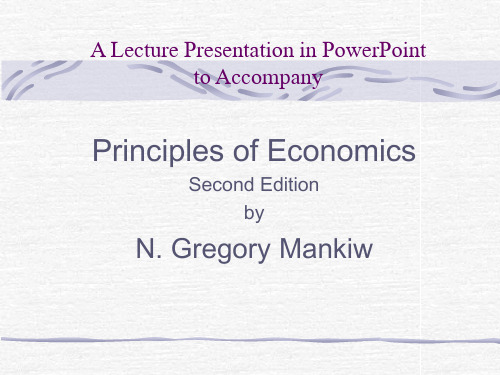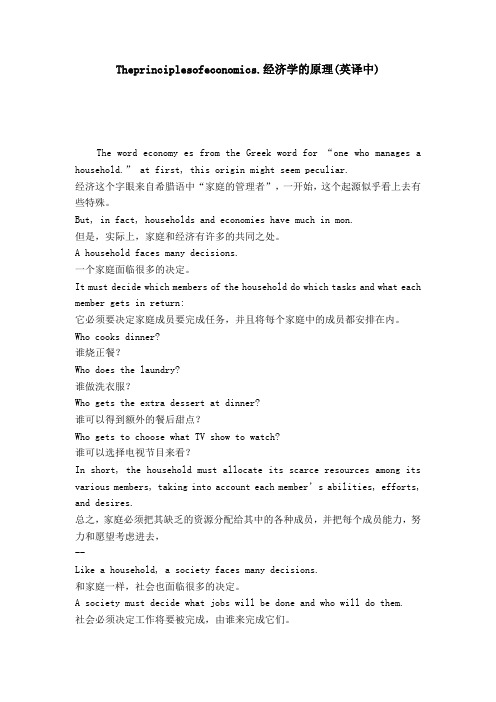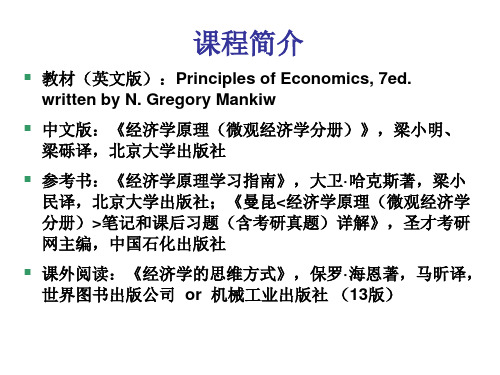Theprinciplesofeconomics.经济学的原理(英译中).
经济学原理英文版第九版课程设计

Principles of Economics, 9th Edition: Course Design Course OverviewThe Principles of Economics course is designed to introduce students to the fundamental concepts of economics. Students will learn about microeconomics, which studies the behavior of individual economic actors such as consumers and firms, and macroeconomics, which focuses on the aggregate behavior of the entire economy. The course is based on the 9th edition of Principles of Economics, written by N. Gregory Mankiw.The course is divided into 14 modules, with each module covering a different topic. The first part of the course covers microeconomics, while the second part focuses on macroeconomics. The modules are designed to build upon each other, so that students can develop a clear understanding of the concepts and theories that underpin economic behavior.Learning ObjectivesAt the end of this course, students will be able to:1.Expln the basic concepts of economics and how they relate toreal-world situations2.Analyze the behavior of individual economic actors such asconsumers, firms, and markets3.Understand the factors that influence the level of economicactivity and growth in the economy4.Evaluate fiscal and monetary policy and their effects on theeconomyCourse ContentModule 1: Ten Principles of EconomicsThis module introduces students to the ten basic principles of economics, such as how people make decisions and how markets work.Module 2: Thinking Like an EconomistThis module teaches students how to think like an economist, including how to make assumptions, use graphs, and analyze data.Module 3: Interdependence and the Gns from TradeThis module explores the concepts of interdependence and trade, and how countries can benefit from specialization and trade.Module 4: The Market Forces of Supply and DemandThis module explns the basic principles of supply and demand and how they interact in markets.Module 5: Elasticity and Its ApplicationThis module delves deeper into the concept of elasticity and how it affects the behavior of buyers and sellers in markets.Module 6: Supply, Demand, and Government PoliciesThis module looks at how governments can influence markets through policies such as price controls and taxes.Module 7: Consumers, Producers, and the Efficiency of MarketsThis module examines the concept of market efficiency and how it can be measured.Module 8: Application: The Costs of TaxationThis module applies the concepts of supply and demand to taxation, analyzing the effects of taxes on the behavior of buyers and sellers.Module 9: International TradeThis module explores the benefits and costs of international trade and analyzes the factors that influence trade patterns between countries.Module 10: ExternalitiesThis module introduces the concept of externalities and how they can affect market outcomes.Module 11: Public Goods and Common ResourcesThis module examines public goods and common resources, analyzingthe role of government in addressing the problems associated with their provision.Module 12: The Design of the Tax SystemThis module discusses the principles of tax design and how they can be applied to create an efficient and fr tax system.Module 13: The Costs of ProductionThis module explores the factors that determine the costs of production and how firms make decisions about production.Module 14: Firms in Competitive MarketsThis module looks at the behavior of firms in competitive marketsand analyzes the factors that influence their decisions about pricingand output.Course RequirementsStudents are expected to attend all lectures and complete all assignments on time. Assignments will include readings from the textbook, problem sets, and written assignments. Grades will be based on class participation, assignments, and exams.ConclusionThe Principles of Economics course provides students with a comprehensive understanding of the fundamental concepts and theoriesthat underpin economic behavior. Students will learn about micro and macroeconomics, market forces, taxation, international trade, and more. Through this course, students will be able to apply economic principles to real-world situations and make informed decisions about economic issues.。
曼昆英文版《经济学原理》01-经济学十大原理

Marginal changes are small, incremental adjustments to an existing plan of action.
People make decisions by comparing costs and benefits at the margin.
Guns v. butter Food v. clothing Leisure time v. work Efficiency v. equity Making decisions requires trading off one goal against another.
1. People face tradeoffs. Efficiency v. Equity
1. People face tradeoffs.
"There is no such thing as a free lunch! lunch!"
1. People face tradeoffs.
To get one thing, we usually have to give up another thing.
7. Governments can sometimes improve market outcomes.
Market failure may also be caused by market power, which is the ability of a single person or firm to unduly influence market prices.
Theprinciplesofeconomics.经济学的原理(英译中)

Theprinciplesofeconomics.经济学的原理(英译中)The word economy es from the Greek word for “one who manages a household.” at first, this origin might seem peculiar.经济这个字眼来自希腊语中“家庭的管理者”,一开始,这个起源似乎看上去有些特殊。
But, in fact, households and economies have much in mon.但是,实际上,家庭和经济有许多的共同之处。
A household faces many decisions.一个家庭面临很多的决定。
It must decide which members of the household do which tasks and what each member gets in return:它必须要决定家庭成员要完成任务,并且将每个家庭中的成员都安排在内。
Who cooks dinner?谁烧正餐?Who does the laundry?谁做洗衣服?Who gets the extra dessert at dinner?谁可以得到额外的餐后甜点?Who gets to choose what TV show to watch?谁可以选择电视节目来看?In short, the household must allocate its scarce resources among its various members, taking into account each member’s abilitie s, efforts, and desires.总之,家庭必须把其缺乏的资源分配给其中的各种成员,并把每个成员能力,努力和愿望考虑进去,--Like a household, a society faces many decisions.和家庭一样,社会也面临很多的决定。
经济学原理英文版

经济学原理英文版Economics is the study of how individuals, businesses, and governments allocate resources to satisfy their needs and wants. It is a social science that examines how people make choices under conditions of scarcity and the consequences of those choices for society. The principles of economics provide a framework for understanding the behavior of individuals, businesses, and governments in the marketplace.One of the fundamental principles of economics is the concept of opportunity cost. Opportunity cost is the value of the next best alternative that is foregone when a choice is made. For example, if a student decides to spend an hour studying for an exam rather than going to the movies, the opportunity cost of studying is the enjoyment and entertainment that could have been gained from watching the movie. Understanding opportunity cost is important because it helps individuals and businesses make more informed decisions about how to allocate their resources.Another important principle of economics is the law of supply and demand. This principle states that the price of a good or service is determined by the relationship between the quantity supplied and the quantity demanded. When the supply of a good or service increases, and the demand for it remains constant, the price will decrease. Conversely, when the demand for a good or service increases, and the supply remains constant, the price will increase. Understanding the law of supply and demand is essential for businesses to set prices and for consumers to make purchasing decisions.In addition to opportunity cost and the law of supply and demand, economics also explores the concepts of production, consumption, and distribution. Production refers to the process of creating goods and services, while consumption refers to the use of those goods and services. Distribution involves the allocation of goods and services to individuals and businesses. These concepts are essential for understanding how resources are used and how wealth is created and distributed in society.Economics also examines the role of government in the economy. Governments play a critical role in regulating markets, providing public goods and services, andredistributing income. The study of economics helps us understand how government policies, such as taxes and subsidies, impact the behavior of individuals and businesses, as well as the overall performance of the economy.In conclusion, the principles of economics provide a framework for understanding how individuals, businesses, and governments make choices about how to allocate resources. By studying economics, we can gain insights into how markets work, how wealth is created and distributed, and how government policies impact the economy. Whether you are a student, a business owner, or a policymaker, a solid understanding of economics is essential for making informed decisions in today's complex and interconnected world.。
【经济学(双语)】【PrinciplesofEconomics】

LO36 项目管理能力。熟悉项目范围、项目时间、项目成本、项目质量、项目人员、 项目沟通、项目风险、项目采购、项目集成管理等。
指标点
LO361 熟悉项目范围、项目时间、项目成本、项目质量、项目人员 LO362 掌握项目策划、项目风险、项目采购 LO363 掌握项目集成管理
LO37 商务策划能力。能用已有的思维成果和创新的方法进行策划。熟悉营销策划原
编号 能力
毕业要求和指标点
LO11 理解他人的观点,尊重他人的观点,能在不同场合用书面或口头形式进行有效
沟通。
表达
LO1
沟通
LO111 倾听他人意见、尊重他人观点、分析他人需求。
指标点
LO112 应用书面或口头形式,阐释自己的观点,有效沟通。
LO21 学生能根据环境需要确定自己的学习目标,并主动地通过搜集信息、分析信
●
尽责 LO4
L0412 诚实守信:为人诚实,信守承诺,尽职尽责。
●
抗压
LO413 爱岗敬业:了解与专业相关的法律法规,充分认识本专业就业岗位
指标点
在社会经济中的作用和地位,在学习和社会实践中遵守职业规范,具备职
业道德操守。
LO414 身心健康,能承受学习和生活中的压力。
LO51 同群体保持良好的合作关系,做集体中的积极成员;善于从创新思维,利用自 己的知识与实践来提出新设想。
1.3.10 Society Faces a Short-run Tradeoff Between Inflation and Unemployment 能力要求:
知道: What is Economy 理解: What is Economics 分析: Market-based / Command-based economy 综合: Ten Principles of Economics 教学重点: Ten Principles of Economics Definition of economy and economics
曼昆英文版《经济学原理》01-经济学十大原理

2. The cost of something is what you give up to get it.
Decisions require comparing costs and benefits of alternatives.
Whether to go to college or to work? Whether to study or go out on a date? Whether to go to class or sleep in?
Society and Scarce Resources: The management of society’s resources is important because resources are scarce.
Scarcity . . .
. . . means that society has limited resources and therefore cannot produce all the goods and services people wish to have.
Economics
Economics is the study of how society manages its scarce resources.
Economists study. . .
How people make decisions. How people interact with each other. The forces and trends that affect the economy as a whole.
Marginal changes are small, incremental adjustments to an existing plan of action.
807经济学基础参考书目

807经济学基础参考书目经济学是一门研究资源配置和决策制定的学科,涉及到各个领域的经济活动。
以下是一些经济学基础参考书目,这些书籍涵盖了经济学的核心概念、理论和方法,适合初学者和进阶学习者。
1. 《经济学原理》(Principles of Economics)- N. Gregory Mankiw这本书是经济学入门的经典教材,涵盖了微观经济学和宏观经济学的基本原理。
它以清晰的语言和实际案例解释了经济学的核心概念,适合初学者。
2. 《经济学》(Economics)- Paul Samuelson和William Nordhaus这本书是经济学领域的经典教材,被广泛用于大学本科经济学课程。
它详细介绍了经济学的各个方面,包括微观经济学、宏观经济学和国际经济学。
3. 《经济学原理》(Economics: Principles and Policy)- William J. Baumol 和Alan S. Blinder这本书以实际案例和政策分析为基础,介绍了经济学的基本原理和政策应用。
它涵盖了微观经济学和宏观经济学的主题,适合对经济学感兴趣的读者。
4. 《经济学:一门科学的思维方式》(Economics: The Science of Common Sense)- David A. Anderson和Dennis J. Sweeney这本书以实际案例和经济学原理为基础,介绍了经济学的基本概念和思维方式。
它强调了经济学在日常生活中的应用,适合初学者。
5. 《经济学:一门科学的思维方式》(Economics: A Contemporary Introduction)- William A. McEachern这本书以实际案例和经济学原理为基础,介绍了经济学的基本概念和方法。
它强调了经济学在现代社会中的应用,适合初学者。
6. 《经济学:原理与政策》(Economics: Principles and Policy)- William J. Baumol和Alan S. Blinder这本书详细介绍了经济学的基本原理和政策应用。
曼昆微观经济学经济学十大原理 英文版

1
CHAPTER
1
Ten Principles of Economics (经济学十大原理)
Economics
PRINCIPLES OF
N. Gregory Mankiw
© 2015 CUFE
In this chapter, look for the answers to these questions:
边际是高等数学微分的概念;理性人决策:边际收益>边际成
本(Do);边际收益<边际成本(Undo)
13
HOW PEOPLE MAKE DECISIONS
Principle #3: 理性人考虑边际量
Rational People Think at the Margin Exampconsiders whether to go to
HOW PEOPLE MAKE DECISIONS
Principle #2: 某种东西的成本是为了得到它而放弃的东西
The Cost of Something Is What You Give Up to Get It
Making decisions requires comparing the costs and
7
Society faces an important tradeoff:
HOW PEOPLE MAKE DECISIONS Principle #1: 人们面临权衡取舍
效率 (efficiency) vs. 平等 (equality)
Efficiency: 社会能从稀缺资源获得最大利益的特性 . when
college for an additional year, he compares the fees & foregone wages to the extra income he could earn with the extra year of education.
